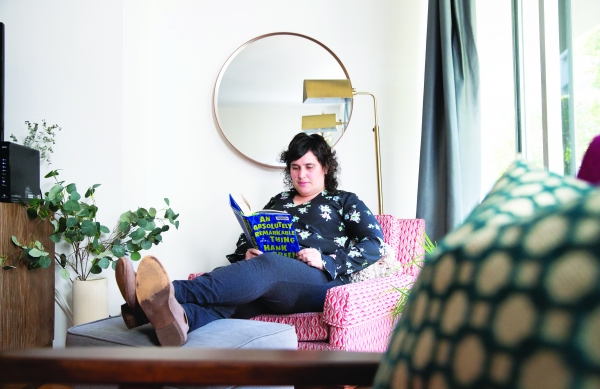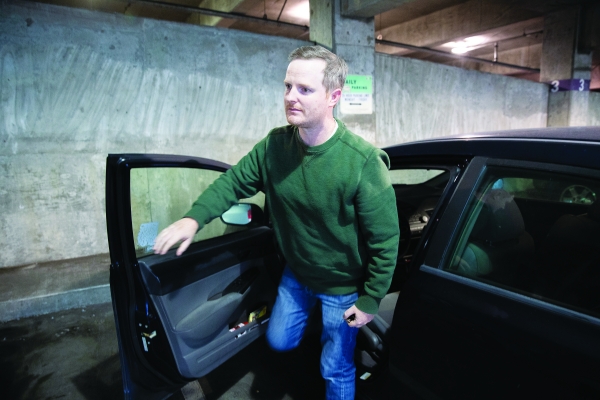The many area teachers who are struggling to remain in their classrooms while keeping a roof over their heads despite the severe shortage of affordable housing find various strategies to stay in the game - some only temporary.
Here are the stories of three high school teachers and one teacher who works in the Portola Valley School District.
A place of her own
Teresa Yeager
School/subject: History teacher at Sequoia High School
Age: 37
High school teacher Teresa Yeager thought she'd never be able to afford to buy a house. That was until she found a down-payment assistance program called Landed.
Up until July, she commuted from her rent-controlled apartment in San Francisco's Duboce Triangle, where she lived for 12 years, to Sequoia High School in Redwood City. This is her 15th year as a teacher there.
"I did see myself here in the long term and felt like the commute was starting to be too much," she said. "For me, moving meant another rental situation, and I wanted to see if I could buy instead of rent."
A commute that took 30 to 35 minutes turned into 45 minutes in the morning as Silicon Valley's economy continued to thrive. In the afternoons, it was taking her an hour to get home from work. She found herself dreading staying longer at school because it meant the traffic would be worse by the time she got on the road.
Yeager found out about Landed in January; six months later, with the startup's help, she bought a one-bedroom condo in Belmont.
"My quality of life has definitely improved," she said. "I'm home earlier because of the shortened commute. I have more time and more stability. I know it's (the house) mine and it's not changing."
Yeager said she also likes feeling closer to the community she teaches in since she actually lives in it now. And she's finding more time to sleep and exercise too.
She said she appreciated the advice Landed provides first-time homeowners along with the financial support. "They helped me navigate the whole home-buying process," she said. "I saw a place on a Tuesday, and put in an offer on a Thursday. ... I felt good about walking through the process, knowing what I was going to encounter and knowing I could ask lots of questions."
Yeager said she is also grateful that Landed offers higher down-payment support than other programs. She was not sure a bid for a house would go through with a lower down payment and that she would be able to afford a mortgage as a single person, she said.
The long road to school
David Talcott
School/subject: Physics/robotics teacher at Carlmont High School
Age: 35
David Talcott's approximately 2.5-hour, two-car, one-train journey to Carlmont High School in Belmont starts at 5:17 a.m. in Antioch.
Talcott drives to the Pittsburg BART station, gets off the train in San Bruno — where he switches to a car he leaves there — and makes the drive down Interstate 280 to Belmont.
In all, Talcott spends close to five hours on the road getting to and from work every day.
Talcott's wife is finishing her doctorate at the University of California at Davis, and the only affordable housing they could find between Davis and Belmont was in Antioch. But even if she were to find a job closer to Belmont, Talcott said, it would be difficult to find a place on the Peninsula because "the (cost of) housing is just too much."
"Ideally we'd have a better situation so there's less time commuting and more time to focus on the things that matter," said Talcott, who has taught at Carlmont for eight years.
One of the things that matters to Talcott is spending more time with his 4-year-old son.
The district itself is a desirable place to work, he said, adding that there aren't a lot of school districts that have physics programs of this caliber. Additionally, the district pays well, and he would make half as much if he taught in the Antioch area, he said.
"We aren't victims here — we chose to do this," he said. "We just didn't want to be poor — we chose wages over the commute. The long days just kind of wear you down."
Talcott said he understands the economics of the situation: Teachers would have to get huge raises to keep up with the booming housing market.
"It's really just a math issue," he said. "The housing market is kind of running away from my family."
Slammed by rent increases
Kerry Keplinger Northen
School/subject: Math and robotics at Corte Madera School, Portola Valley
Age: 32
One constant in Kerry Keplinger Northen's life as a teacher in Portola Valley has been moving.
Keplinger Northen has been hit with rent increases each time her apartment leases end — sometimes as much as 10 percent. She now lives in a two-bedroom duplex in Cupertino and hopes her rent doesn't go up substantially when her lease is up in February.
"My quality of life is rough — I tutor one day a week to make some extra money so we can eat," she said. Right now, her commute home is 45 minutes if she leaves at 3:15 p.m., but every minute she lingers before getting on the road could mean an extra five to 15 minutes minutes of driving time. If she waits until 3:30, it takes her an hour and a half to get home.
"It really pulls on my heartstrings that I don't feel like I can stay here for the football games or be more involved in the community I teach in," she said.
Keplinger Northen's 1-year-old daughter has already moved twice. She worries that her daughter's quality of life will suffer because she and her husband are both teachers.
"Will she have to move schools? Thankfully, she can go to a school where we teach, but she wouldn't live in the community where she's going to school."
Keplinger Northen grew up in Palo Alto, where her mother was a teacher and her father was a construction worker. They had a really great life, Keplinger said, and bought a home in Palo Alto, something Keplinger said she can't see herself being able to do because of the high cost of real estate.
"I can't see myself doing anything else (other than teaching)," she said. "I just wish we were able to have the same opportunities that my parents had.
"It's a struggle. We would love to buy a house. A lot of (assistance) programs still need a 10 percent down payment. When you're living paycheck to paycheck, you're just never going to save that."
But she doesn't blame her school district for her housing woes. It's "pretty much out of their hands," she said. But, she added, politicians could be doing more — for example, putting more money into education or providing teacher housing.
She is concerned that the cost of living is driving people away from even going into teaching. "A person with a BA in math could get a starting position at Facebook or Google and make way more than I make eight years in (to teaching)," she said. "They want to make money for their family, which I totally understand."
Keplinger Northen said she has to stay in the area because her stepdaughter's mother lives in Morgan Hill, and the stepdaughter stays with Keplinger Northen and her husband part of the time. She considered living in Morgan Hill, but that commute would be hours, she said. She also relies on free child care from her parents and her mother-in-law.
'Home' away from home
Gregory Schmid
School/subject: Human biology and Medical/Clinical I at Sequoia High School
Age: 41
Teacher Gregory Schmid spends nearly half of his week sleeping on another teacher's couch.
He owns a home in Penngrove, which is 70 miles north, near Petaluma, and started the commute in the summer of 2017. A commute from Penngrove daily is just too much unproductive time, he said. It would take three to three and half hours in traffic each way, he said.
He is grateful he's able to crash on his fellow teacher's couch during the week, but it's a delicate balance between friendship and work relationships. It's hard having to impose on someone else's space, he said, but he compensates his colleague with dinners and supplies for the house.
"I do feel a fatigue," he said. "I try really hard not to let it affect my interactions with students or family, but that's a challenge."
It's also hard not getting to see his wife and 5-year-old daughter "nearly as much" as he was able to before splitting his time between Penngrove and the Peninsula.
"My wife is single parenting, which is very difficult as you might imagine," he said. "There's the added stress of having to coordinate. Sleep doesn't happen as often as you'd like."
Before the move to Penngrove, he spent about eight years renting in Redwood City. "It was too much money to give away like that," he said.
But Schmid loves his job. He is building a unique program for students interested in getting an early start in the medical profession. He teaches a course called Medical/Clinical I for Sequoia's Health Careers Academy. Students learn about HIPAA (Health Insurance Portability and Accountability Act) and laws governing health care, and gain other health-care-related skills. Students also complete FEMA Community Emergency Response Team (CERT) training and certification.
"I'm just not done," he said. "I love the school. I love the community. I love the kids. Starting over just doesn't sound like much fun to me."
He would also make less money if he taught somewhere else. "That's difficult too," he said.
The district's teachers union advocates well for teacher salaries, he said. "There's a lot of compassion and empathy" in his community.
"I wish there were creative solutions to make it easier, but we don't know what those solutions would be," he said.
See related stories:





Comments
another community
on Dec 21, 2018 at 12:31 pm
on Dec 21, 2018 at 12:31 pm
Where is the leadership? Do school boards just not communicate with cities about the need for teacher housing, or it it that city leaders think it’s a school district problem (so they just keep rubber stamping high end homes)? All these well-heeled parents in affected communities can’t figure something out? Isn’t this the innovation hub of the US? It’s so bizarre to me that other than handwringing nobody acts.
Menlo Park: Sharon Heights
on Dec 21, 2018 at 3:10 pm
on Dec 21, 2018 at 3:10 pm
Sounds like Mr. Talcott's issue is more one of geography than money. If your spouse is getting a degree at Davis and you work in Belmont, it looks to me that splitting the middle would be to live near Antioch due to minimizing or equalizing both commutes. Pick a different school to get a PhD or find a different high school to teach in that are closer together. Otherwise, suck it up for a few years, get the PhD completed, have the spouse find a job on the Peninsula, and move closer to work. I'm not sure what this story has to do with affordable housing. If they lived in Belmont, they'd be griping about how the spouse has a 6 hour commute each day to attend Davis. Don't quite get this one...
Menlo Park: The Willows
on Dec 21, 2018 at 10:16 pm
on Dec 21, 2018 at 10:16 pm
Three out of these four teachers have a child.
It costs approximately $275,000 to raise a child from birth to 18 years.
If you choose to have a child, you're choosing to spend a lot of your money on things like diapers, formula, day care/nanny, clothes, toys, car seat/stroller, and other expenses. Therefore, it will be more of a struggle to buy a house.
Having a child is optional; having a roof over your head and money to pay your bills it not. If you can't afford a house, how will you afford a child?
I guess I tend to be more sympathetic towards teachers who are struggling but don't have a child since they are doing everything they can to afford housing. If they have a child and then complain that they can't afford a house, I think, "Well, raising a child is expensive! That was your decision."
Menlo-Atherton High School
on Dec 22, 2018 at 10:31 am
on Dec 22, 2018 at 10:31 am
From the above examples, the takeaway shouldn't be 'look how far away they have to live.' The takeaway needs to be 'look how long it takes to get from here (school) to there (home).'
Our transportation infrastructure is atrocious compared to most other modern metropolitan areas, and THAT is the reason why commuting from less-expensive locations is not a viable option for so many, and one of the primary reasons why local housing is so expensive; it forces more people to compete for the same housing to avoid a multi-hour commute.
I have experience living in London, for example, and it's not uncommon for workers to live on the outskirts of that metropolitan area and commute to high-paying jobs in London proper. That's feasible in that metropolitan area because they implemented a comprehensive public transportation infrastructure that provides broad coverage, making longer-distance commutes viable.
In the entire bay area, we have a grand total of 1 public transportation route into SF and the peninsula: the bart tunnel. That's IT. That's terrible. We need more, and there's no reason to not have more: we're already taxed up the wazoo on transportation-centric sales taxes and bonds.
We need more public transportation. GET IT DONE!
Menlo Park: The Willows
on Dec 24, 2018 at 7:50 am
on Dec 24, 2018 at 7:50 am
Although you might be technical right, where are we as a society if we judge having a child purely by economical means? Where are we as a society if we deny our teachers to have children by themselves? What kind of teachers will they become? Sorry but your comment is from a world I do not want to live in.
another community
on Dec 24, 2018 at 10:19 am
on Dec 24, 2018 at 10:19 am
It's not that simple. Since the Bay Area is a giant group of individual cities, doing anything like regional transit means dealing with politics in each one that the line would run through. BART could have circled the Bay if not for San Mateo pulling out during the initial construction. Caltrain could have been electrified by now if not for Atherton continually trying to derail the process. All of these efforts would be infinitely easier if all of the cities were converted to boroughs under a single city government, but that's unlikely to happen unless the political gridlock preventing these problems from getting fixed causes the state to come in and reorganize things.